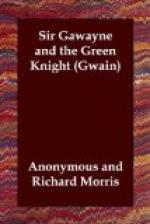1736 [G] In a mery mantyle, mete to þe erþe,
Þat wat3 furred ful fyne with felle3, wel pured,
No hwe3 goud on hir hede, bot þe ha3er stones
Trased aboute hir tressour, be twenty in clusteres;
1740 [H] Hir þryuen face & hir þrote þrowen al naked,
Hir brest bare bifore, & bihinde eke.
[I] Ho come3 with-inne þe chambre dore, & closes hit hir after,
[J] Wayne3[1] vp a wyndow, & on þe wy3e calle3,
1744 & radly þus re-hayted hym, with hir riche worde3,
with[2] chere;
[K] “A! mon, how may þou slepe,
[L] Þis morning is so clere?” [Fol. 114b.]
1748 He wat3 in drowping depe,
Bot þenne he con hir here.
[Sidenote A: Then was it fine sport to listen
to the hounds,] [Sidenote B: and the hallooing
of the hunters.] [Sidenote C: There the fox was
threatened and called a thief.] [Sidenote D:
But Reynard was wily,] [Sidenote E: and led them
astray over mounts.] [Sidenote F: Meanwhile the
knight at home soundly sleeps within his comely
curtains.]
[Sidenote G: The lady of the castle, clothed
in a rich mantle,] [Sidenote H: her throat and
bosom all bare,] [Sidenote I: comes to Gawayne’s
chamber,] [Sidenote J: opens a window, and says,]
[Sidenote K: “Ah! man, how canst thou sleep,]
[Sidenote L: this morning is so clear?”]
[Footnote 1: wayue3(?).] [Footnote 2: bi,
a sec. manu.]
XXV.
[A] In dre3 droupyng of dreme
draueled þat noble,
As mon þat wat3 in mornyng of mony þro þo3tes,
1752 How þat destine schulde þat day [dy3t] his
wyrde,
At þe grene chapel, when he þe gome metes,
& bi-houes his buffet abide, with-oute debate
more;
[B] Bot quen þat comly he keuered his wyttes,
1756 Swenges out of þe sweuenes, & sware3 with
hast.
Þe lady luflych com la3ande swete,
[C] Felle ouer his fayre face, & fetly him kyssed;
He welcume3 hir worþily, with a wale chere;
1760 He se3 hir so glorious, & gayly atyred,
So fautles of hir fetures, & of so fyne hewes,
[D] Wi3t wallande Ioye warmed his hert;
With smoþe smylyng & smolt þay smeten in-to
merþe,
1764 Þat al wat3 blis & bonchef, þat breke hem
bi-twene,
& wynne,
Þay lanced wordes gode,
Much wele þen wat3 þer-inne,
1768 [E] Gret perile bi-twene hem stod,
Nif mare of hir kny3t mynne.
[Sidenote A: The knight was then dreaming of
his forthcoming adventure at
the Green Chapel.]
[Sidenote B: He awakes and speaks to his fair
visitor,] [Sidenote C: who sweetly kisses him.]
[Sidenote D: Great joy warms the heart of Sir
Gawayne,] [Sidenote E: and “great peril
between them stood.”]
XXVI.
[A] For þat prynce of pris de-presed
hym so þikke.
Nurned hym so ne3e þe þred, þat nede hym
bi-houed,
1772 Oþer lach þer hir luf, oþer lodly re-fuse;
He cared for his cortaysye, lest craþayn
he were,
[B] & more for his meschef, 3if he schulde make




